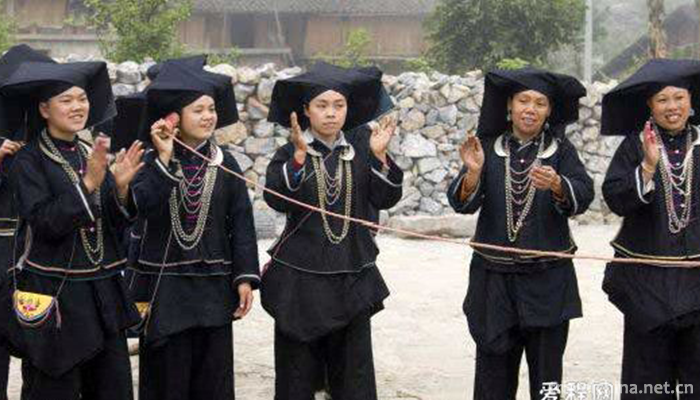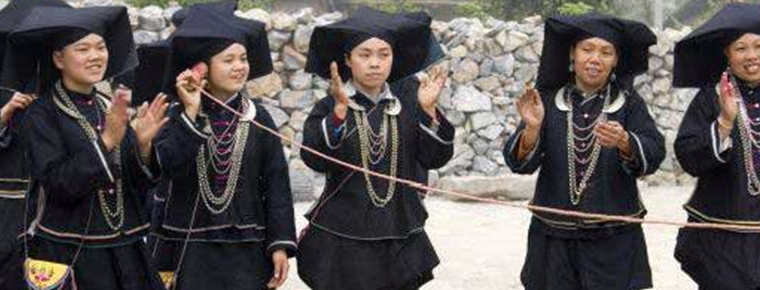Napo Zhuang Folk Songs
Napo Zhuang Folk Songs
Napo Zhuang, also known as "Heiyizhuang", is a unique ethnic group among the Zhuang people. It calls itself "Min", "Zhong", "Ouch". Now there are about 518,000 people. They are named for their all-black clothes. They mainly live in Napo County, Guangxi, which is located on the border between China and Vietnam. Napo Zhuang folk song is a folk song that they have sung from generation to generation. In the long history, Heiyizhuang still preserves ancient, complete and colorful folk songs, and is known as the "rich mine of Guangxi national music" and the "living fossil" of Zhuang folk songs.
The Zhuang people in black can not only sing, but also dance well. In some villages in Napo County where black clothes are strong and live together, from three-year-old children to ancient rare elderly people can dance with ancient music, such as welcome dance, black gun dance, wedding dance, last general dance and so on. The scene is magnificent. Heiyizhuang's clothes with black as beauty, original and beautiful folk songs even developed into two-part ensemble, the melody is soft and long.
On May 20, 2006, Napo Zhuang folk songs were listed in the first batch of national intangible cultural heritage list with the approval of the State Council.
historical origin
Napo Mountain Song has a long history, diverse forms and rich content. In the long process of development, Napo Zhuang folk songs have formed the characteristics of interdependence with folk customs, rich and colorful content and original ecology. Besides the functions of communication, propaganda, education and entertainment, Napo Zhuang folk songs have historical, academic, artistic and practical values. They are the relics of the ancient ballad culture of the Zhuang nationality.
artistic characteristics
Point by tone
It can be divided into six categories, i.e. albeit sensitive, ni's ah, lun, Chunniu tune, inviting celestial song and pan-sharp, about 160 sets. Among them, "Nidi" is the meaning of "good" in Napo Zhuang Language of Guangxi, and is commonly used as a lining in folk songs spread in Heiyizhuang living areas. The "Nide'a" folk song has become the symbol of the music of the Zhuang nationality because of its fresh and bright tune and unique artistic charm.
By content
Napo Zhuang folk songs mainly include narrative songs of myths and legends, biographies of characters, environmental changes, historical events, etc; songs of bitterness pouring out misery and complaining oppression; agricultural songs reflecting nature and life experience; eulogies for beautiful scenery; ritual songs for receiving people and things; folk songs expressing traditional customs; sacrificial songs mourning mourning; sacrificial songs celebrating the full moon of marriage, the completion of new residence and the birthday of the elderly. A toast song. The most abundant are love songs, which contain more than 20 kinds of content, such as lyric, first love, even love, teasing, gambling, esteem, pledge, praise, acacia, loyalty, separation, exhortation, regret, nostalgia, reunion, bitterness, sigh, struggle, old age and so on.
Representative Works
Representational repertoires include "Although entertaining guests", "On the Creation", "Liquor Song", "Pange", "Song of ancestors worship" and so on.
Inheritance Significance
At the opening ceremony of Nanning International Folk Song Festival in November 2001, Heiyizhuang shocked four people by showing his beautiful black clothes and singing folk songs. So far, it has attracted the attention of scholars, musicians and photographers both at home and abroad, and has gone deep into the Dashi Mountain to suck the nutrition of art.
Due to the changes in the cultural space for survival and development, the disappearance of the main ways of inheritance, the shrinking of the activity venues and the fault between teachers and inheritors, Heiyizhuang ballads are facing a severe crisis of inheritance. Therefore, it is imperative to rescue, dig, sort out and protect the songs of the Black Clothes Zhuang.


-
1.Bassoon ba song cuo
Basongtao, also known as Caogao Lake, means "green water" in Tibetan. It is about 18 kilometers long. Its surface area is about 27 square kilometers.
Time 2019-01-02 -
2.Jinshuitai Hot Spring Scenic Area
Jinshuitai Hot Spring is a hot spring resort built according to the national AAAA scenic standard. It is located in Shuitai Town, Xinxing County, Guangdong Province
Time 2019-01-27 -
3.Tibetan Medicine
Tibetan medicine is a bright pearl in the treasure house of Chinese medicine. The Tibetan people living in the snow-covered plateau for generations have accumulated
Time 2019-04-05 -
4.Sintering Techniques of Cizhou Kiln
Cizhou kiln firing technology, the local traditional firing technology of Fengfeng mining area in Hebei Province, is one of the national intangible cultural heritage.
Time 2019-04-22 -
5.Maonan people beat monkey drum
"Monkey Drum Dance" is a traditional dance of Maonan nationality in Guizhou Province, which is used for funeral activities and performed by wizards. It is spread in some villages of Pingtang
Time 2019-05-26 -
6.Andai Dance of Mongolian Nationality
Andai Dance originated from the Kulun Banner. According to textual research, Andai Dance was formed in the late Ming and early Qing Dynasty. At that time, the Kulun system was "the unity of polit
Time 2019-06-03 -
7.Puppet Head Sculpture
Zhangzhou puppet head carving is a traditional folk arts and crafts in Zhangzhou City, Fujian Province. It belongs to a special skill in the production of puppet stage props. Zhangzhou puppet head car
Time 2019-06-06 -
8.Salt drying Techniques
Salt-drying process is a special kind of handicraft technology. Its existing form is different from the general intangible culture. Its products are closely related to people's daily life and industri
Time 2019-06-13 -
9.Shizhu Tujia Luoer Diao
Shizhu Tujia Luoer Diao originated from Shizhu Tujia Autonomous County, Chongqing. It is a folk song of Luoer tune, which is popular among the Han and Tujia nationalities in southeastern Chongqing. It
Time 2019-06-15 -
10.The Tu nationality in Yuqiu
Tu nationality, spread in Nianduyu Village, Tongren County, Qinghai Province, is a unique local folk culture form. It is held from November 5 to 20 of the lunar calendar every year. It includes ceremo
Time 2019-06-23 -
11.Beijing University Of Chemical Technology
Founded in 1958, Beijing University of Chemical Technology, formerly known as Beijing Institute of Chemical Technology, is a high-level university founded by New China for "training advanced chem
Time 2019-09-06 -
12.Administrative division of Yibin
Yibin City has 10 county-level administrative divisions (Municipal District 3, county 7), 136 township level administrative divisions (street 14, town 105, township 17). It covers an area of 13271 square kilometers and has a population of 5.52 million. Yibin Municipal
Time 2020-12-18